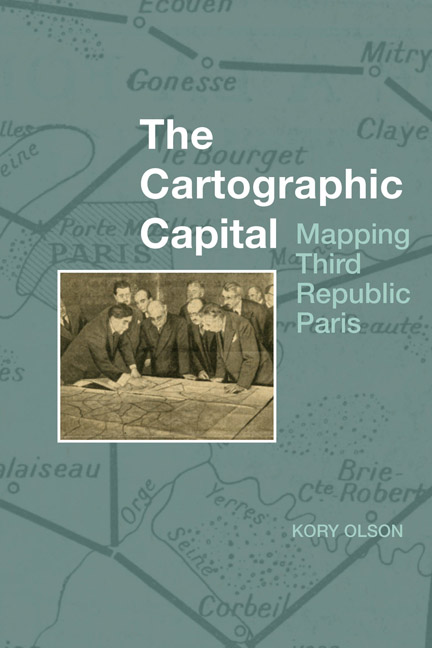Book contents
- Frontmatter
- Contents
- List of Figures
- Acknowledgements
- Introduction: Creating Republican Paris
- 1 Working with Maps
- 2 Creating Map Readers: The Rise of Geography and Cartography in Nineteenth-Century France
- 3 The Triumphant Republic: ‘Paris en 1889, les opérations de voirie exécutées entre 1871 et 1889’
- 4 A New Way of Seeing Paris: The Service Géographique's Carte de France
- 5 The Beginning of French Urbanism: Léon Jaussely's 1919 Plan d'extension
- 6 The Rise of Suburban Paris: Henri Prost's Carte générale
- Conclusion
- Bibliography
- Index
3 - The Triumphant Republic: ‘Paris en 1889, les opérations de voirie exécutées entre 1871 et 1889’
- Frontmatter
- Contents
- List of Figures
- Acknowledgements
- Introduction: Creating Republican Paris
- 1 Working with Maps
- 2 Creating Map Readers: The Rise of Geography and Cartography in Nineteenth-Century France
- 3 The Triumphant Republic: ‘Paris en 1889, les opérations de voirie exécutées entre 1871 et 1889’
- 4 A New Way of Seeing Paris: The Service Géographique's Carte de France
- 5 The Beginning of French Urbanism: Léon Jaussely's 1919 Plan d'extension
- 6 The Rise of Suburban Paris: Henri Prost's Carte générale
- Conclusion
- Bibliography
- Index
Summary
Ne devions-nous pas, à l'occasion du Centenaire de 1789, […] glorifier hautement, cette République qui, aux jours de péril, avait ressaisi l’épée brisée de la France et avait su la rendre encore plus redoutable à l'adversaire, cette République qui avait ensuite cicatrisé les blessures de la patrie?
—Jean Frollo (pseudonym), qtd in Wieviorka 144The centennial of the storming of the Bastille prison in 1789 marked a significant milestone for the French republic. The subsequent hundred years had brought to France a return of the Bourbons, the Orleanists’ July Monarchy, Napoleon Bonaparte and his nephew, and the Second and Third Republics. Unfortunately, most of these regime changes resulted from rebellion, revolution, or coup d’état. Needless to say, the chaotic nineteenth century did little to instil in the average Frenchman faith in the government's ability to remain in power for the long term. Yet, as the symbolic anniversary approached, there was a sense of optimism in the French capital for the last two decades had passed relatively violence free. Memories of the military defeat and the Commune remained fresh in many people's minds, but the ensuing two decades had confirmed the Republic's supremacy.
Even as the city prepared to celebrate, the Republic that existed in 1889 overcame many obstacles. The royalist Comte de Chambord's official rejection of the tricolour flag in 1871 effectively ended any hope of the Bourbons’ return to power in France. Even as late as 1888, General Boulanger's political ascent briefly threatened the nascent democracy. In the city, the Third Republic experienced obstacles to taming Paris, as demonstrated by the anxiety preceding the funerals of Adolphe Thiers and Léon Gambetta. Early on, these events tested the government's ability to control Parisian crowds. Disruptions reminded the regime of the many revolts and revolutions throughout the nineteenth century and its perceived inability to govern Paris, and that major events could be either good or bad for the city. Even the selection, after much debate, of 14 July as the officially designated fête nationale in 1880 proved the difficulty of deciding how to recognize and acknowledge the Republic. Yet, as little as five years later, in 18851 Victor Hugo's trouble-free funeral procession and subsequent induction into the Panthéon would eventually demonstrate France's ability to manage its capital city.
- Type
- Chapter
- Information
- The Cartographic CapitalMapping Third Republic Paris, 1889-1934, pp. 86 - 129Publisher: Liverpool University PressPrint publication year: 2018



